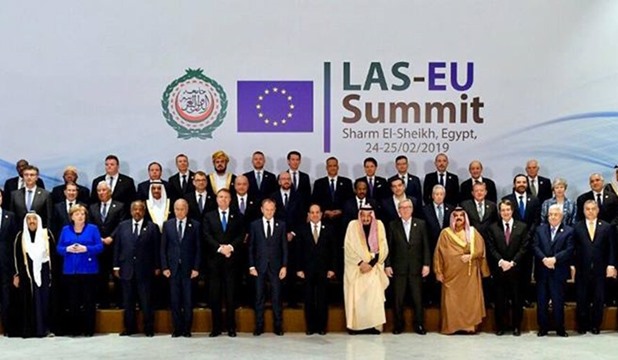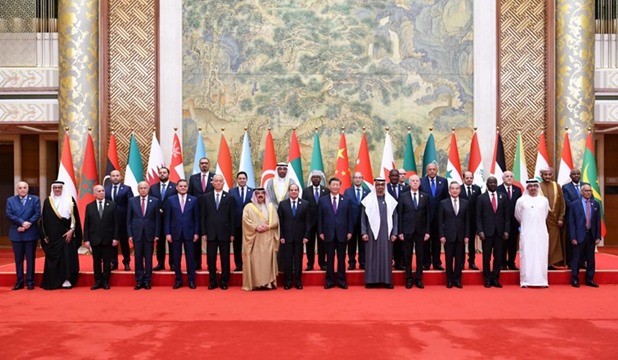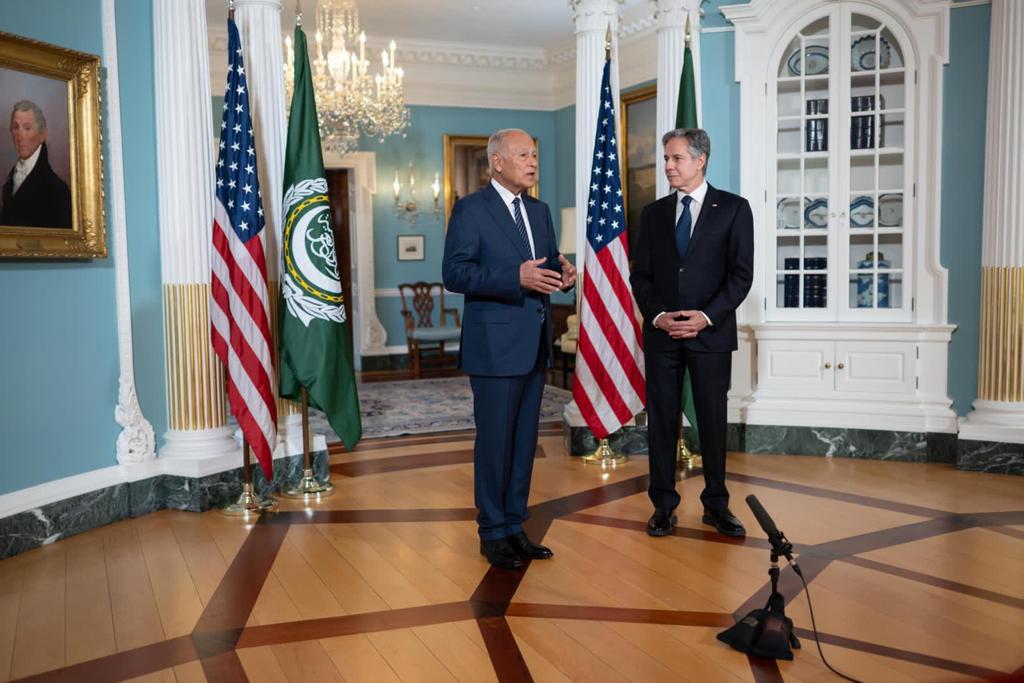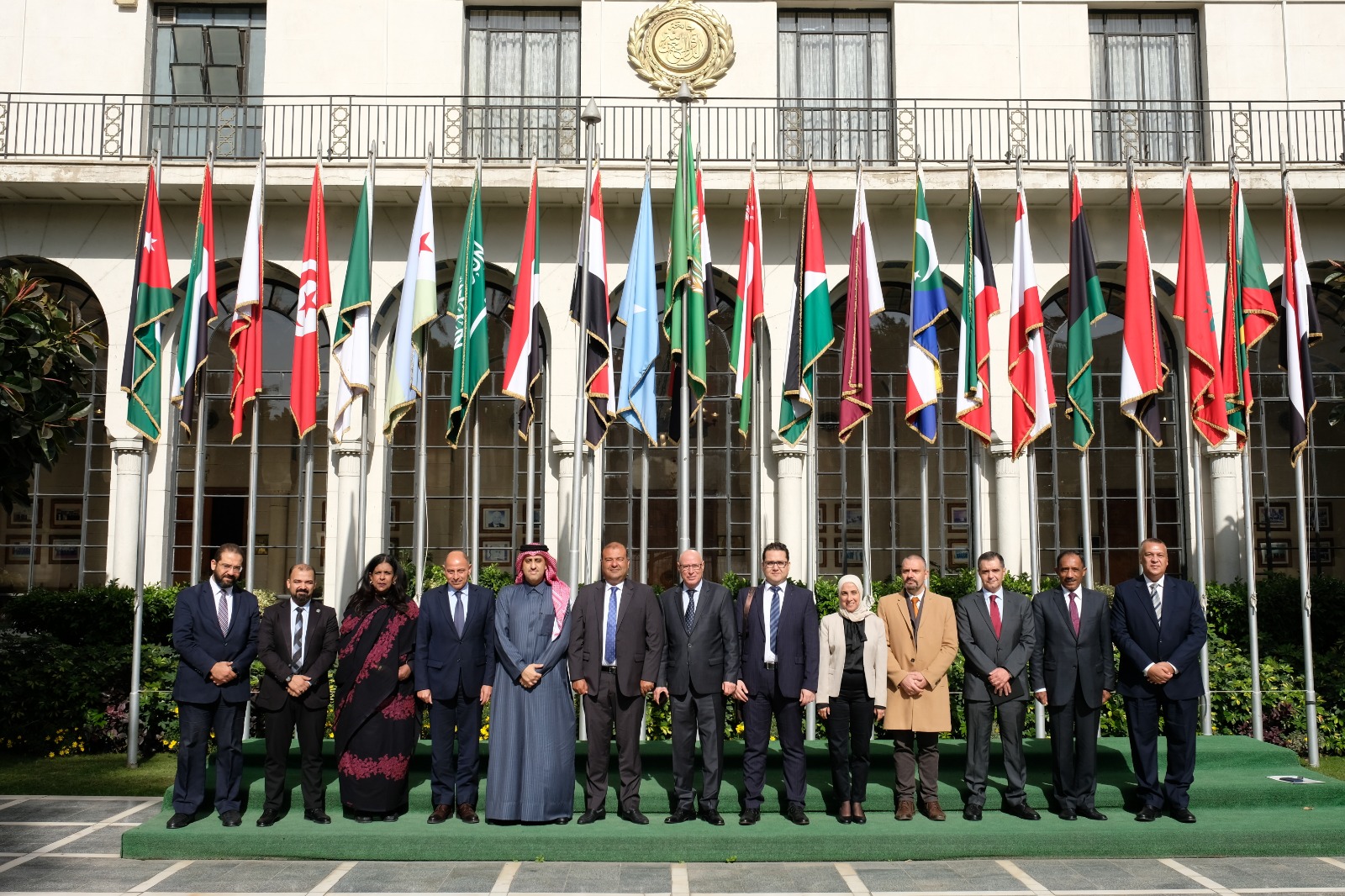Since its inception, the League of Arab States has represented the unified Arab vision to the world. For 80 years, it has diligently worked to coordinate Arab policies and positions, act as the collective voice of the Arab Group internationally, and defend Arab interests in global forums. This mandate necessitates continuous coordination and the establishment of dialogue channels with other nations, organisations, and regional and international blocs. Key achievements in this regard include:
Arab-European Cooperation:
In 2006, the Arab-European Dialogue Forum was launched as a new mechanism to enhance collective relations between the Arab world and Europe, facilitated through the League of Arab States and the European Union (EU). Over time, institutional ties between the two sides evolved, leading to the initiation of the Strategic Dialogue between the League of Arab States General Secretariat and the European External Action Service (EEAS) in 2015. This dialogue aims to bolster cooperation mechanisms between the two institutions, encompassing five primary working groups: Counter-Terrorism, Migration, Climate and Security, Food Security, and Non-Proliferation of Weapons of Mass Destruction and Arms Control. Arab-European relations culminated in 2019 with the convening of the first Arab-European Summit. This landmark event sought to strengthen and intensify Arab-European cooperation, propelling it towards broader horizons to confront shared challenges, achieve security, stability, and development for the peoples of both regions, and place Arab issues prominently on the international agenda.
for more information:

Arab-African Cooperation:
Arab-African cooperation stands as one of the oldest frameworks of inter-regional collaboration. Stemming from geographical proximity, it encompasses deep economic, cultural, human, and civilisational bonds forged over centuries of social interaction and cultural exchange between Arab and African peoples.
These strong ties fostered the emergence of institutionalised Arab-African cooperation from the early 1970s, marked by the first Arab-African Summit held in Cairo in March 1977. Over the past four decades, concerted efforts have been made to advance Arab-African collaboration in economic, financial, and cultural spheres. Arab financial institutions provide technical and financial development assistance to African nations, notably including the Arab Bank for Economic Development in Africa (BADEA). Prominent ongoing cooperation programmes include: the Afro-Arab Cultural Institute, the Joint Afro-Arab Fund for Disaster Response, Arab-African Cooperation on Migration, the Afro-Arab Trade Fair, in addition to collaboration in agriculture and finance.
Furthermore, the League of Arab States has established several offices and missions in various African countries to enhance political and diplomatic cooperation: the League of Arab States Mission in Addis Ababa, Ethiopia; the Mission in Nairobi, Kenya; the League of Arab States Office in Juba, South Sudan; and the Mission in Pretoria, South Africa.
Migration represents a key portfolio within Arab-African cooperation. The third Arab-African Summit, held in Kuwait in November 2013, established the Afro-Arab Technical Coordination Committee on Migration to strengthen the partnership in this domain. The Committee works towards finding sustainable solutions to migration challenges by raising awareness about the risks of irregular migration and ensuring the protection of migrants' rights within the member states of both organisations.
للمزيد حول التعاون العربي الأفريقي: اضغط هنا
The seventh Arab Summit in Rabat in 1974 established the Arab Fund for Technical Assistance to African Countries (AFTAAC). Its objective is to drive economic development across the African continent by providing technical assistance to African professionals. In practice, AFTAAC serves as a political instrument for the League of Arab States, reinforcing the strategic partnership that underpins Arab-African cooperation and fosters closer ties between Arab and African peoples. The Fund's activities support and complement the overarching strategic goals pursued by the League of Arab States and its member states in collaboration with African partners under the League of Arab States umbrella. This is particularly significant given the escalating Israeli activity on the African continent, which primarily focuses on direct technical aid aimed at weakening African solidarity with Arab causes and priorities, and influencing the voting patterns of African states on resolutions related to the Palestinian issue in the United Nations and other international forums. Consequently, it is imperative to redouble Arab efforts to counter this activity and safeguard Arab interests
Arab-Chinese Cooperation:
Established in 2004, the China-Arab States Cooperation Forum (CASCF) is considered one of the most significant and successful cooperation forums initiated by the League of Arab States with international partners. Its activities have convened continuously without interruption for 20 years. The sectoral cooperation mechanisms within its framework have expanded to approximately 20. The Forum has also evolved to the summit level, with the first China-Arab States Summit held in Riyadh in December 2022. Ministerial meetings are held biennially, alternating between host locations, and issue final communiqués addressing regional and international issues of mutual concern. These ministerial meetings also produce implementation programmes covering diverse areas of economic, social, cultural, media, and development cooperation. This structure has significantly enhanced collective Arab engagement with this major rising Asian power. Various meetings of the forum have been distinguished by high-level participation from all Arab states and the People's Republic of China.
للمزيد حول منتدى التعاون العربي الصيني: اضغط هنا

Arab-Russian Cooperation:
A Memorandum of Understanding (MoU) was signed between the League of Arab States General Secretariat and the Russian Ministry of Foreign Affairs in 2003, marking the initial step towards strengthening cooperation between the League and the Russian Federation across various fields. A further cooperation memorandum was signed in December 2009, establishing the Arab-Russian Cooperation Forum. This agreement provided for cooperation in diverse forms—political, economic, trade, and investment—as well as scientific and cultural collaboration. The Forum was officially launched in Moscow on February 20, 2013, and has convened six sessions to date: Moscow (2013), Khartoum (2014), Moscow (2016), Abu Dhabi (2017), Moscow (2019), and Marrakech (2023).
Arab-US Cooperation:
An MoU was signed between the League of Arab States General Secretariat and the US Department of State in 2012, outlining joint activities in several areas, including humanitarian assistance, training, open education, and exchange visits. The General Secretariat has remained committed to maintaining dialogue and consultation with US officials across various domains. The objective is to open channels for communication and engagement to present Arab perspectives and positions, and to articulate Arab aspirations for a more effective and impartial US role concerning various Arab issues, primarily the Palestinian cause.
In 2023, the Strategic Dialogue between the League of Arab States and the United States was launched. The inaugural meeting facilitated an exchange of views, aimed at aligning perspectives and consolidating efforts, particularly on issues of mutual interest, and establishing an action plan and organisational structure for future cooperation.

Arab Cooperation with South American Countries:
Relations between Arab nations and South American countries represent a significant aspect of institutionalised inter-regional cooperation, embodied by the Summit of South American-Arab Countries (ASPA), which has convened periodically since its inception in Brasilia in 2005. The Riyadh Summit in 2015 issued the Riyadh Declaration, reaffirming the foundational principles of cooperation and the necessity of enhancing it within the framework of South-South dialogue. This aims to advance relations across political, economic, and social dimensions to serve mutual interests.
Furthermore, numerous MoUs and cooperation agreements have been signed with most Latin American and Caribbean nations. These agreements facilitate coordination on various cooperation portfolios spanning social, economic, cultural, legal, and media fields. For instance, the General Secretariat signed an MoU with the United Mexican States to establish the Mexican Fund for International Cooperation, aimed at implementing joint activities and cooperation projects in cultural and social domains.
Among the areas of collaboration is the coordination of efforts in intellectual property (IP). The final declaration of the second ASPA Summit in 2009 included provisions for IP cooperation. Similarly, the third Summit in Lima in 2012 produced the "Lima Declaration," which also contained clauses on intellectual property. To implement the Lima Declaration, the General Secretariat held joint meetings in collaboration with the World Intellectual Property Organisation (WIPO) and the Brazilian National Institute of Industrial Property (INPI) to facilitate the exchange of expertise between Arab and Brazilian counterparts in this field.
Economic Forum with Central Asian Countries:
The concept for this forum originated from an initiative proposed by the Kingdom of Saudi Arabia in 2008. Central Asian countries welcomed the idea, and the Republic of Azerbaijan also requested to join. An MoU on Cooperation between the League of Arab States General Secretariat and the Central Asian Countries and Azerbaijan was signed in Riyadh in 2014. The Forum convenes at the level of Ministers of Foreign Affairs, Economy, Trade, and Finance. Three sessions have been held to date: Riyadh (2014), Dushanbe (2017), and Doha (2024).
Arab international cooperation is not limited to major blocs; the bonds of collaboration extend both eastward and westward. This includes:
Arab-Indian Cooperation: Governed by a cooperation forum established in 2008.
Arab-Japanese Cooperation: Initiated in 2009, with five sessions held so far. The General Secretariat has worked closely with the Japanese side to conclude a cooperation memorandum encompassing political dialogue and collaboration in cultural and scientific fields. Additionally, Arab-Japanese cooperation exists in intellectual property rights protection, involving the Japan Patent Office, aimed at exchanging expertise through technical support and advanced technologies to enhance the operations of governmental IP offices. Several sessions of the Japan-Arab Economic Forum have also been organised.
للمزيد حول التعاون العربي الياباني: اضغط هنا
إFurthermore, a significant number of MoUs have been concluded with other Asian countries and regional organisations in Asia. These agreements facilitate political meetings and consultations between officials from the General Secretariat and their counterparts in Asian governments. Notable MoUs include those with: Australia, New Zealand, Pakistan, Vietnam, Indonesia, South Korea, and the Shanghai Cooperation Organisation.

ا
Multilateral Relations:
A prominent aspect of the League of Arab States's international engagement aimed at protecting Arab interests is its cooperation with other international organisations. This includes the entire United Nations system, the Organisation of Islamic Cooperation (OIC), the Non-Aligned Movement (NAM), the International Organisation of La Francophonie, and various other international and regional bodies. Action plans are developed to coordinate activities across different sectors, joint programmes and projects are established, and international positions are harmonised by leveraging expertise and experiences from diverse nations and mobilising support for Arab causes.
One of the League of Arab States' key achievements in cooperating with other international and regional entities involves coordinating procedures related to unified Arab candidacies for international positions, whereby the Arab Group presents a single, representative candidate.
Cooperation between the League of Arab States and the OIC exemplifies successful multilateral collaboration. The General Secretariats of both organisations signed a joint cooperation agreement in 1989 to enhance cooperation, support solidarity, consolidate efforts, and coordinate positions on issues of common interest in political, media, economic, cultural, scientific, technical fields, and the dialogue of civilisations. The agreement also provides for reciprocal participation in meetings at all levels (summit, ministerial, or specialised councils).
Regular coordination takes place between the Arab Group and the Islamic Group at the United Nations to support Arab-sponsored resolutions or prevent the passage of resolutions that contradict Arab interests. This coordination is particularly relevant concerning the nomination of certain foreign countries for membership in the Security Council or influential international decision-making positions, based on their voting patterns on resolutions related to the Palestinian cause. In 2017, during an extraordinary session, the League of Arab States Council adopted a resolution establishing a tripartite coordination mechanism involving the League of Arab States, the OIC, and the African Union (AU) to explore ways to support the Palestinian cause in international forums.
Following the Israeli aggression on the Gaza Strip in October 2023, both the League of Arab States and the OIC convened extraordinary summits to discuss joint Arab and Islamic actions to confront this aggression. A resolution mandated the establishment of two specialised legal monitoring units to prepare legal arguments concerning all violations of international law and international humanitarian law committed by the occupying authorities against the Palestinian people in Gaza and the occupied territories. It also called for coordinating Arab diplomatic action abroad to stop the war on Gaza, pressing for a serious and genuine political process to achieve a just and comprehensive peace, demanding the lifting of the siege on Gaza, and enforcing the entry of Arab, Islamic, and international humanitarian aid convoys.
In essence, the League of Arab States represents the unified Arab voice in international forums across various fields and issues pertinent to Arab nations. Examples include:
Arms Control: Committed to enhancing the security of Arab states and establishing a Middle East zone free of nuclear weapons, the League of Arab States has successfully coordinated Arab positions in various international forums and events. During the 53rd Ordinary Session of the IAEA General Conference in 2009, Arab states succeeded in adopting a resolution titled "Israeli Nuclear Capabilities," demanding Israel's accession to the Non-Proliferation Treaty (NPT) and the placement of all its nuclear facilities under the IAEA's comprehensive safeguards system. This success resulted from efforts by the League of Arab States and Arab states to persuade other nations to reconsider their previous opposition to the resolution.
Furthermore, an Arab initiative, the "Arab Forum on Arms Control, Disarmament and Non-Proliferation," was launched in cooperation with Qatar's National Committee for the Prohibition of Weapons, under the patronage of the Deputy Prime Minister and Minister of State for Defense Affairs.
Convinced that successful regional collective action against illicit small arms and light weapons (SALW) requires simultaneously enhancing national Arab capacities to address any gaps, the League of Arab States, in collaboration with the European Union, initiated an ambitious cooperation project starting in 2018 and continuing until 2027. This project aims to strengthen the capabilities of national institutions in Arab states, contributing to increased inter-Arab cooperation and capacity building through the transfer of acquired expertise and identification of best practices and lessons learned, with technical support from implementing partners: INTERPOL, the World Customs Organisation (WCO), and the Small Arms Survey programme.
Women's Issues: The League of Arab States supported the Arab proposal for the UN General Assembly to adopt a unified resolution providing a comprehensive response to the challenges of COVID-19. To facilitate this, the League of Arab States endorsed the draft resolution on women, presented by the Arab Republic of Egypt, the People's Democratic Republic of Algeria, and the Kingdom of Saudi Arabia, titled "Rapid Response to the Needs of Women and Girls in the Context of Measures to Combat the Novel Coronavirus." The Arab Women's Committee, during its extraordinary meeting in 2020, recommended that member states support this resolution.
Annually, the General Secretariat participates in preparations for the UN Commission on the Status of Women (CSW) by drafting the "Arab Statement," which serves as a unified Arab position presented during CSW meetings. The presidency of the Arab Women's Committee delivers the Arab Statement on behalf of the Arab Group during the Commission's opening session.
Environment, Climate, and Water: Following the adoption of the Arab Ministerial Declaration on Climate Change in 2007, the Arab Negotiating Group on Climate Change Issues was formed. Additionally, an Arab negotiating team was established to follow up on the Intergovernmental Negotiating Committee to end plastic pollution, and another Arab negotiating team monitors international conventions related to the ozone layer.
The League of Arab States also signed a cooperation memorandum between the Arab Ministerial Water Council and the World Water Council. In 2011, the World Water Council agreed to treat the Arab world as a single geographical group.
Sustainable Development: The League of Arab States has forged partnerships with various actors and stakeholders to support Arab states' efforts in implementing the Sustainable Development Goals (SDGs) in the Arab region. This includes regular participation in the meetings of the Regional Coordination Mechanism (RCM) for the Arab Region and membership in the RCM's working group on the 2030 Agenda for Sustainable Development. The League of Arab States actively participates in regional and international conferences and activities related to sustainable development to highlight its efforts in this field, transfer outstanding international experiences to the Arab region for adaptation, and coordinate Arab positions before and during regional and international meetings. The League of Arab States has established a network of regional and international relations through partnerships with regional and international organisations, civil society organisations working in sustainable development, and collaboration with the private sector to establish development projects in Arab countries.
Communications: The League of Arab States serves as the representative organisation for the Arab Regional Group within the International Telecommunication Union (ITU). It has also signed an MoU with the Digital Cooperation Organisation (DCO) for collaboration in areas related to digital topics, including the digital economy, digital transformation, and bridging the digital divide.
Education: The League of Arab States and the Union for the Mediterranean (UfM) signed an MoU in November 2022 to enhance cooperation in higher education, research, and innovation.
Migration and Asylum: In 2014, the Council of the League of Arab States decided to establish the Arab Regional Consultative Process on Migration and Asylum (ARCP). This serves as a flexible forum for Arab member states to facilitate dialogue and cooperation on migration and asylum issues of common interest, aiming to unify Arab perspectives and formulate a collective Arab position to be adopted by member states and presented in international forums.
Economic Relations: In 2024, the League of Arab States launched the Arab-International Initiative titled "Lita'arafou" (To Know One Another) in collaboration with the Union of Arab Chambers and OPENET-ANTIKA company. The initiative aims to organise periodic Arab exhibitions in foreign countries hosting joint Arab chambers of commerce, thereby increasing Arab interaction with the world and strengthening Arab economic and investment relations with those countries at both governmental and private sector levels.

****
